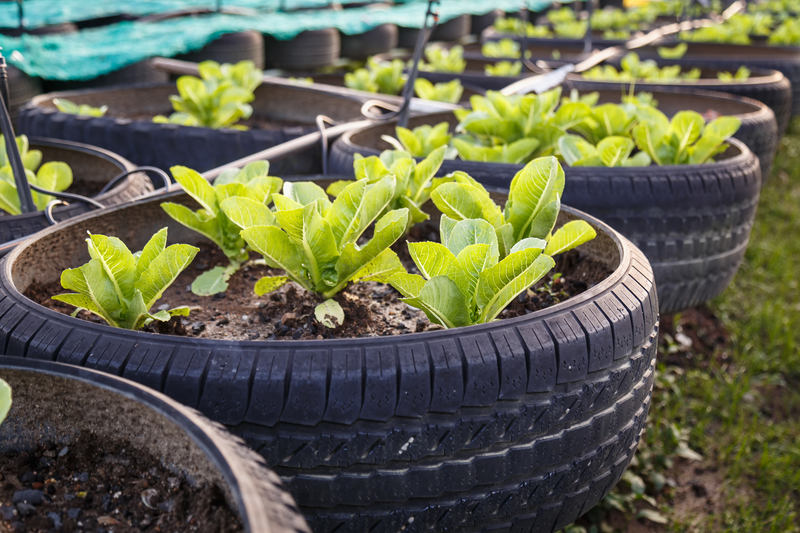Limiting Garden Waste Production: Strategies and Benefits
Gardening is a fulfilling activity that offers numerous benefits, from aesthetic pleasure to mental well-being and ecological advantages. However, it can also generate significant amounts of waste that contribute to environmental degradation. Limiting garden waste production is imperative for creating sustainable gardening practices. This article delves into various strategies to achieve this goal and the benefits associated with them.
The Importance of Reducing Garden Waste
Garden waste, comprising of grass clippings, prunings, leaves, and other organic materials, can be an environmental hazard if not properly managed. When sent to landfill, garden waste decomposes anaerobically, producing methane, a potent greenhouse gas. By limiting garden waste production, we can reduce methane emissions, conserve resources, and promote a healthier ecosystem.

Composting: Nature's Recycling System
One of the most effective ways to limit garden waste is through composting. Composting not only reduces the volume of waste but also turns organic matter into a valuable soil amendment rich in nutrients.
How to Compost
- Aerobic Composting: This method involves the decomposition of organic matter through the action of aerobic microorganisms. Regular turning of the compost pile and proper moisture management are crucial.
- Vermicomposting: Utilizing earthworms, particularly red wigglers, to break down organic waste into highly nutritious vermicompost.
- Bokashi Composting: An anaerobic process that ferments waste in a closed container, ideal for small gardens or urban settings.
Grasscycling: Rethink the Mowing Routine
Grasscycling involves leaving grass clippings on the lawn after mowing instead of bagging them for disposal. This practice can dramatically reduce garden waste and has additional benefits:
- Nutrient Return: Grass clippings decompose quickly, returning valuable nutrients to the soil, which enhances grass health and reduces the need for fertilizers.
- Moisture Retention: Clippings act as a mulch, helping the soil retain moisture and reducing the frequency of watering.
Mulching: The Protective Cover
Mulching involves applying a layer of material, such as wood chips, leaves, or straw, to the soil's surface. It offers several benefits:
- Weed Suppression: Mulch prevents weed seed germination by blocking sunlight, reducing the need for herbicides.
- Soil Health: As mulch decomposes, it enriches the soil with organic matter and improves soil structure.
- Reduced Waste: By reusing garden prunings and leaves as mulch, the volume of waste sent to landfill is significantly reduced.
Pruning and Plant Selection
Strategic pruning and selecting appropriate plants for your garden can also help in minimizing waste production.
- Select Native Plants: Native plants are well-adapted to local conditions and typically require less maintenance, reducing pruning and waste generation.
- Regular Pruning: Prune plants regularly to maintain their shape and health, which can help decrease the amount of waste produced during seasonal clean-ups.
- Use Prunings as Support: Transform large prunings into stakes or supports for climbing plants rather than discarding them.
Smart Watering Practices
Efficient watering can help prevent rapid plant growth, which often leads to more frequent pruning and greater waste generation.
- Drip Irrigation: This method delivers water directly to plant roots, reducing water waste and preventing excessive plant growth.
- Rainwater Harvesting: Use rain barrels to collect and store rainwater for garden use, which is both eco-friendly and cost-effective.
Seasonal Planning and Crop Rotation
Planning your garden according to the seasons and practicing crop rotation can also help limit garden waste.
- Gleaning: Harvest all produce to minimize waste. Unharvested produce can become compost material, but gleaning helps reduce initial waste.
- Crop Rotation: Rotating crops yearly prevents soil depletion, enhances soil fertility, and reduces the need for chemical inputs.
Recycling Hard Garden Waste
Not all garden waste is organic. Hard garden waste, such as plastic pots, broken tools, and old garden furniture, can also accumulate. Recycling and reusing these items is vital for waste reduction.
- Recycle Plastics: Clean and recycle plastic pots and containers at local recycling centers.
- Upcycling: Convert broken tools and equipment into creative garden art or practical implements, minimizing landfill contributions.

Community Efforts and Education
Efforts to limit garden waste should not be confined to individual actions. Community programs and educational initiatives can amplify the impact.
- Community Gardens: Shared spaces can implement waste reduction practices on a larger scale, offering a model for individual gardeners.
- Workshops and Seminars: Local government and organizations can host events to educate the public about sustainable gardening practices.
- Garden Waste Collection Programs: Municipalities can organize garden waste collection and composting services to reduce landfill waste.
Conclusion
Limiting garden waste production is a multifaceted endeavor, encompassing composting, grasscycling, mulching, strategic pruning, smart watering, and seasonal planning. Additionally, recycling hard garden waste and engaging in community efforts play a crucial role. By adopting these sustainable gardening practices, we can not only reduce our environmental footprint but also foster healthier and more productive gardens. Embracing these methods leads to a more sustainable future, where gardens thrive in harmony with the environment.
